Our concerns process
The following information is available in Welsh: Ein proses pryderon
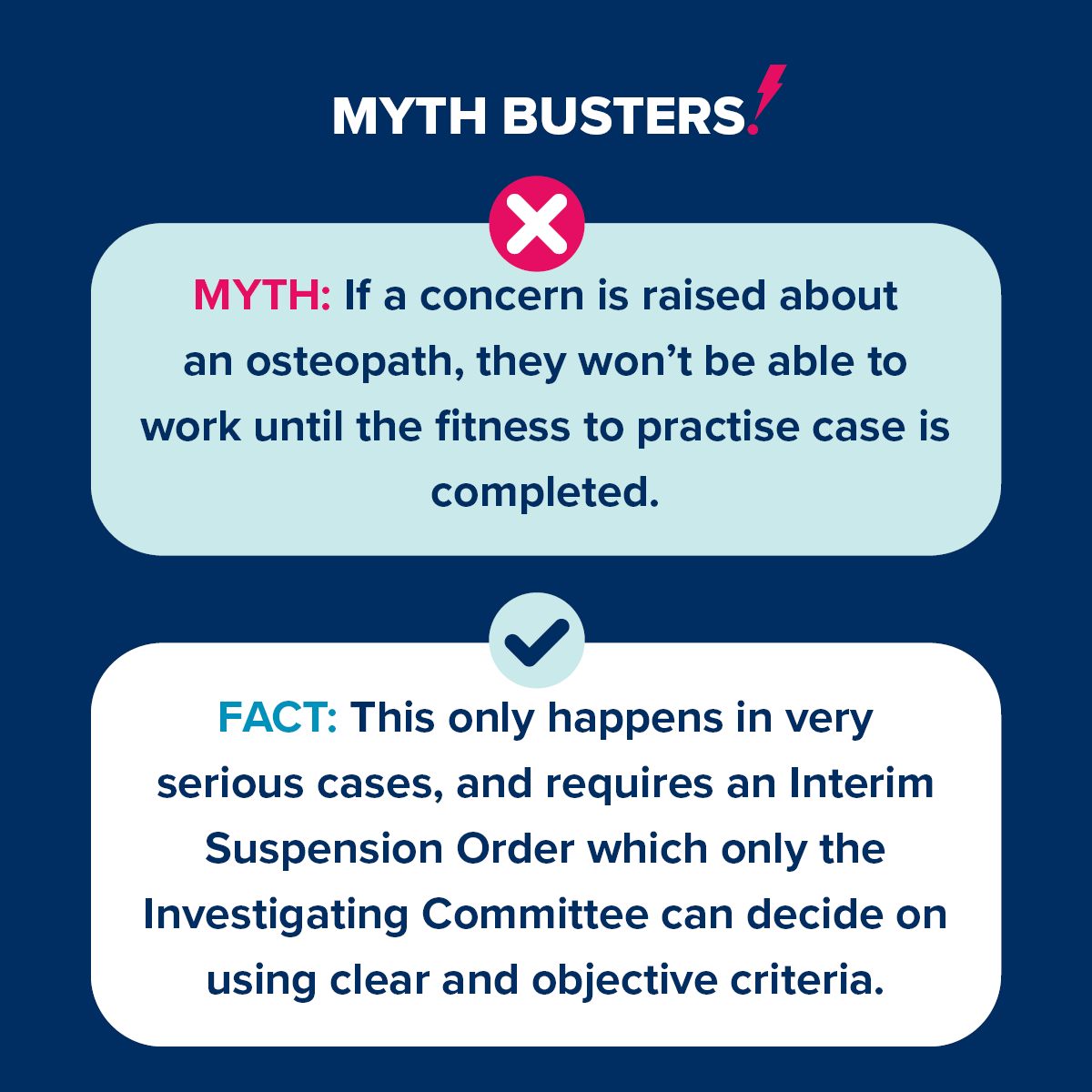 We receive around 75 concerns a year and around 25 concerns about osteopaths go through to the Investigating Committee to consider, with only about half of these going all the way to the Professional Conduct Committee. We aim to progress concerns as swiftly as possible, ensuring a high level of care for everyone involved. A concern is reviewed by a Screener within 9 weeks of receipt. Around half of the cases reviewed by a Screener are closed with no further action.
We receive around 75 concerns a year and around 25 concerns about osteopaths go through to the Investigating Committee to consider, with only about half of these going all the way to the Professional Conduct Committee. We aim to progress concerns as swiftly as possible, ensuring a high level of care for everyone involved. A concern is reviewed by a Screener within 9 weeks of receipt. Around half of the cases reviewed by a Screener are closed with no further action.
When we receive a concern, we consider whether we have enough information to send this to a screener (see ‘Screening a concern’ below). Occasionally we may need to gather more information so that we have enough detail for the concern to be effectively considered by a screener.
The illustrated timelines on this page show how a typical case progresses week by week, from the time we receive the concern.
Screening a concern
When we receive a concern, and once we are satisfied that we have enough detail, an independent osteopath (known as a 'screener') will review the concern(s) to consider whether the General Osteopathic Council (GOsC) can investigate. The screener makes their decision with reference to our guidance on threshold criteria for unacceptable professional conduct.
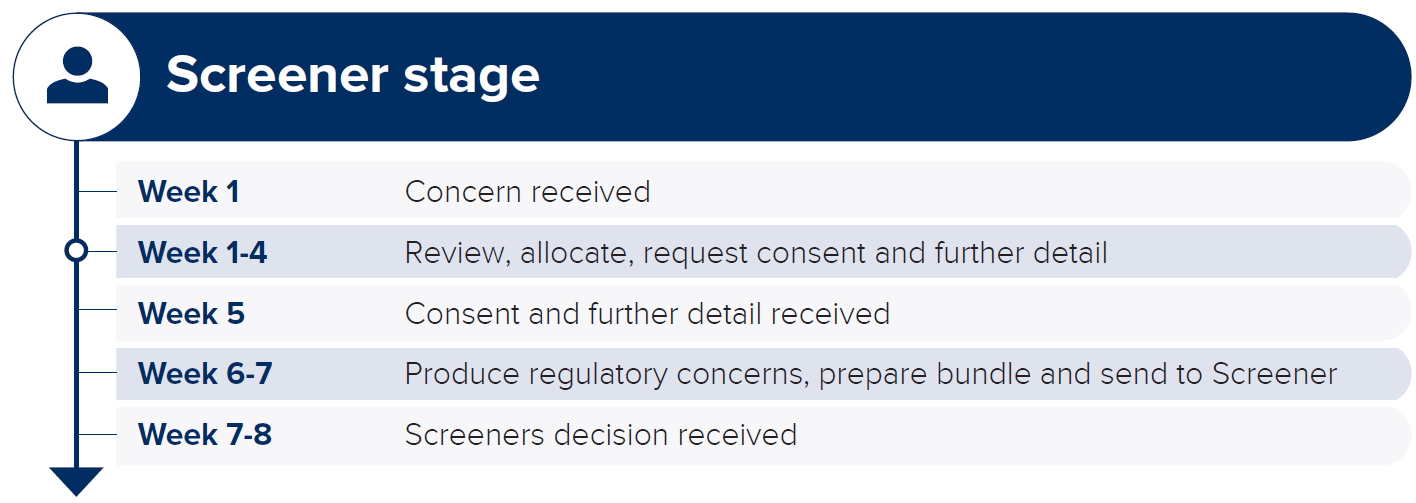
This guidance lists some of the types of concerns that wouldn’t generally be investigated because they would not normally amount to unacceptable professional conduct. Furthermore, the screener may refer to Initial Closure Procedure and our Guidance for Screeners.
We will contact the person who raised the concern should we require any further information to assist the screener in making an informed decision.
The screener will not close a concern without talking to a lay Council member (someone who is not an osteopath). However, this does not apply when a concern is closed under the Initial Closure Procedure.
If we can't deal with your concern
If we find that we can't deal with your concern, we will contact you and tell you why. It may be that your allegations do not amount to a breach of professional standards, because they are not relevant to the work of the osteopath, or because there is unlikely to be sufficient evidence to support the concern.
Investigating a concern
Cases are considered by the Investigating Committee within 26 weeks of receiving the concern. The Investigating Committee closes 41% of the cases it considers.
Once we start to investigate a concern, we usually contact the osteopath you have raised the concern about, send them the details of your complaint and ask for a response. We might need to take a witness statement from you about your concern, and we will contact you to discuss this. We might also need to ask for information from other people as part of the investigation. For example, if your concern relates to your medical condition we might need to look at copies of your medical records from other practitioners, such as your doctor.
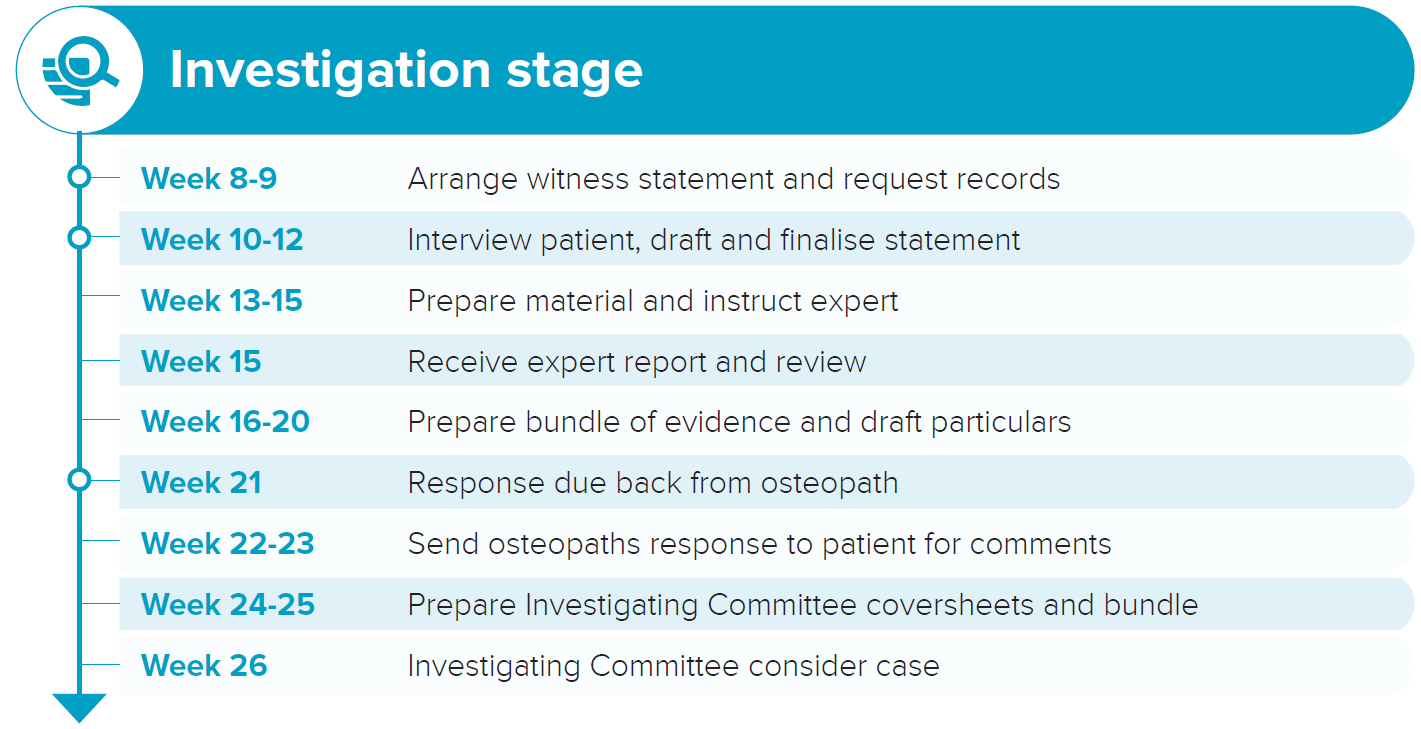
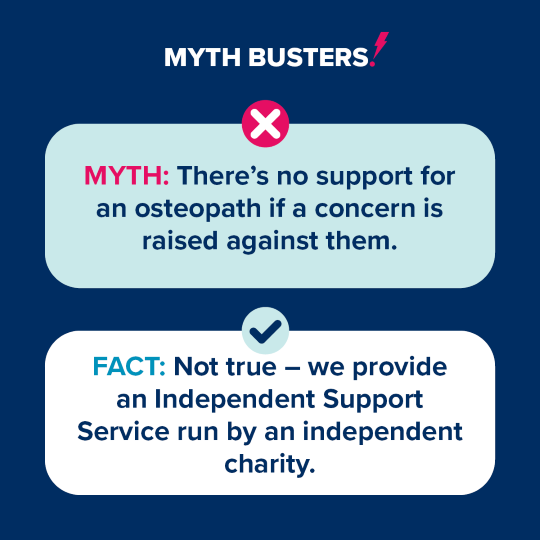 Then we ask our Investigating Committee to look at all the information that has been collected. This committee is made up of osteopaths and lay members (non-osteopaths) and chaired by a lay person. They may ask for more information from you, the osteopath or other people, such as your doctor.
Then we ask our Investigating Committee to look at all the information that has been collected. This committee is made up of osteopaths and lay members (non-osteopaths) and chaired by a lay person. They may ask for more information from you, the osteopath or other people, such as your doctor.
The committee will decide whether all the information collected supports your concern and whether the allegations would amount to any of the following:
- unacceptable professional conduct
- professional incompetence
- a criminal conviction in the UK that is relevant to the work of the osteopath
- a medical condition that seriously affects the osteopath’s ability to practise.
If the Investigating Committee believes that the concern does not indicate any of these, they will find that there is no case to answer and your concern won’t be looked at anymore. We will tell you why the committee made this decision. But if the committee finds that there is a case to answer, we will arrange a public hearing and instruct our solicitors to prepare the case against the osteopath.
The Investigating Committee is assisted in determining whether there is a case for the osteopath to answer by the Investigating Committee Decision-making Guidance and the guidance on threshold criteria for unacceptable professional conduct.
 Interim suspension orders
Interim suspension orders
It is only in cases involving very significant sexual boundary issues, police charges for a serious offence or situations when patient care falls to low standards that an osteopath might be stopped from practising until the case is completed. This is called an interim suspension order (ISO). It’s only the Investigating Committee that can make a decision to suspend.
Guidance on Imposing Interim Suspension Orders is used by the fitness to practise committees, when considering whether to impose an interim suspension order. The Professional Conduct Committee and Health Committee can also decide to impose an interim suspension order pending an appeal against a decision.
Concluding a case without a hearing (Rule 8)
In certain circumstances, cases that the Investigating Committee has referred to the Professional Conduct Committee may be concluded without a hearing. The procedure for dealing with these types of case is set out in Rule 8 of the General Osteopathic Council (Professional Conduct Committee) (Procedure) Rules. The Professional Conduct Committee will only consider using this procedure if the case meets certain criteria, and if the Committee thinks that the sanction of admonishment would be appropriate.
Before deciding whether or not to use the procedure, the PCC will consider the views of the complainant and the registrant. The registrant must agree that the case can be considered without a hearing, and must be prepared to fully admit the facts and the allegations against him or her. The determination of the Committee will be published on the GOsC website in the usual way.
For further information about this and about the criteria for disposing of a case under Rule 8, and the procedures involved, see PCC Practice Note - Consensual Disposal: Rule 8.
Hearings
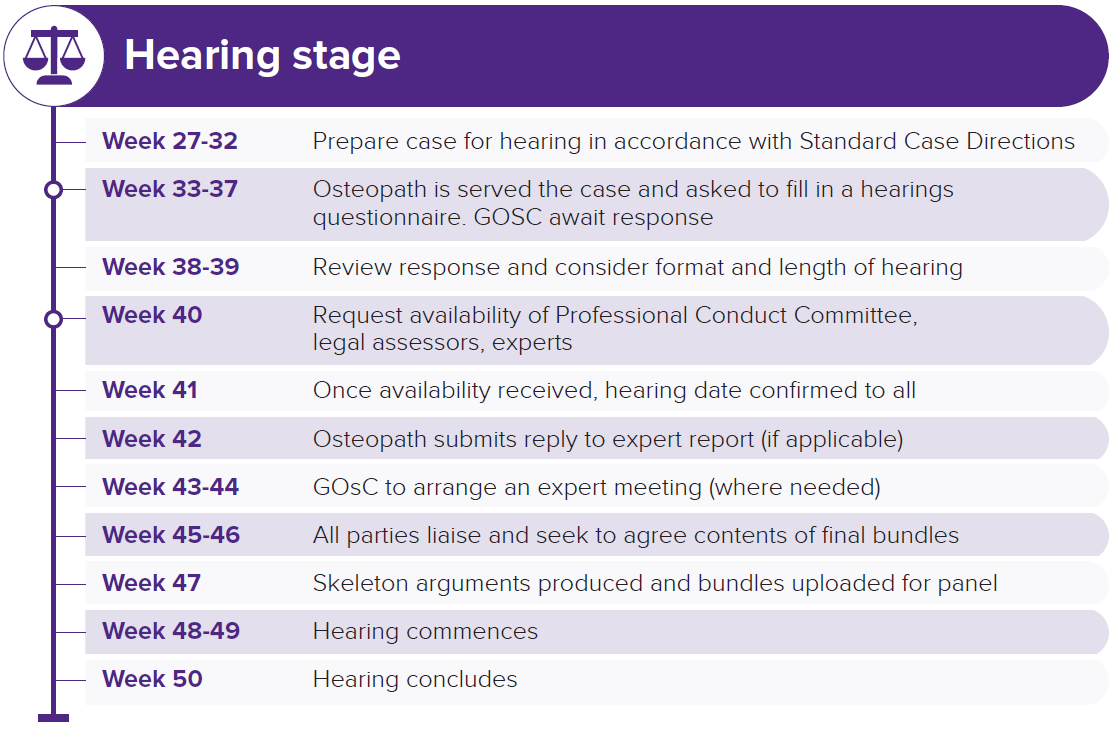
Professional Conduct Committee
If the concern relates to an osteopath's professional conduct or competence, or a criminal conviction that is relevant to his/her work, it will be heard by the Professional Conduct Committee. You may need to attend the hearing as a witness to give evidence on oath about your concern. See the Hearings section for more information about hearings and what happens after a hearing.
Health Committee
Concerns about an osteopath's mental or physical health are passed to the Health Committee, which is made up of osteopaths and non-osteopaths and at least one registered medical practitioner. This committee can look at cases without having a hearing. It meets in private because it has to consider an osteopath’s medical condition.
If there are serious worries about the osteopath’s health, the committee may require the osteopath to meet certain conditions. There is Guidance for the Health Committee on Formulating Conditions of Practice Orders to assist the committee if it decides to impose Conditions of Practice. The committee can also stop the osteopath from working for a set time by suspending their registration.
Fitness to practise
Maintaining patient safety and public confidence in the osteopathic profession sits at the heart of fitness to practise and, by law, we must investigate and consider concerns about osteopaths’ conduct, competence or health.
The GOsC’s Regulation department handles any concerns about the fitness to practise of osteopaths on the Register. We publish the Fitness to Practise report annually. These reports, and further information on the standards which support osteopaths in improving their practice and complying with legislation are available in our Fitness to Practise pages.



